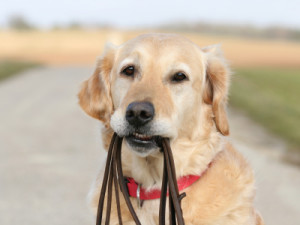Dog Training 101 – Young And Adult Dogs Can Learn The Basics
 Whether you’re a first-time dog owner or a seasoned one, a puppy’s behavior can test your patience: exuberant bounding; jumping, licking and nipping; the stolen socks and chewed-on shoes; and best of all, misinterpreting “Come here!” as “Run!”
Whether you’re a first-time dog owner or a seasoned one, a puppy’s behavior can test your patience: exuberant bounding; jumping, licking and nipping; the stolen socks and chewed-on shoes; and best of all, misinterpreting “Come here!” as “Run!”
This may be cute at first, but as your puppy grows, many of these behaviors become a nuisance and possibly dangerous for both you and your dog. Dog obedience training can curb bad behavior. Teaching your dog that you’re in charge could potentially protect him from harm–such as running into the street. It takes a lot of patience to train your pet, whether he’s a puppy or a mature dog. But it’s possible , no matter what his age. Here are some keep things you’ll want your dog to learn.
Consistency, Consistency, Consistency
- You can begin working with your dog when he is 7-8 weeks old. Some tips to keep in mind along the way are:
- Use a specific word for each command, and say it in the same tone. For instance, make sure everyone in your home knows that when you want him to sit, you say “Sit”–so your husband won’t say, “Sit down,” and your child, “Butt on the floor!”
- Pick a certain training method and stick with it. Offer a command, such as “Sit”, once once, or else your dog will think he doesn’t have to sit untile you’ve repeated it 35 times.
- Limit your training sessions to 10 or 15 minutes per day.
- Always be in control. It will be counterproductive if you lose your patience or become angry. Your dog is trying to please you but won’t always understand what you want him to do right away.
- Don’t over-praise. A “good dog,” small treat or pat is perfect. Too much praise is overkill and distracts from your message.
- End your training session on a positive note. Have your dog obey a command he knows, then praise him.
Basic Commands: Come, Sit, Stay, Down, Heel
If your dog learns there commands, he will be a much more enjoyable member of your household. This will also help develop your dog’s social skills where there are guests at the house.
Teaching Old Dogs New Tricks
Older dogs are still interested in doing new things. Take into consideration and physical limitations they might have, depending upon their age and health. Older dogs are generally more challenging to train because they have established behaviors. Being consistent and patient with older dogs is perhaps even more important than with training puppies. While an older dog’s attention span is a bit longer, it will serve you both best to conduct training sessions in short spans. Don’t rely to heavily on treats as rewards. Older dogs can be less active and can have trouble shedding extra pounds.
Don’t Give Up
Training and behavior problems can be incredibly frustrating. Never hit or scream at your dog or he will become fearful of you. Certain things–such as growling, baring teeth or biting–should never be permitted. Contact your veterinarian immediately if your dog exhibits these dangerous behaviors.
Remember that a well-trained dog is a joy to have in the family. A dog that knows what’s expected of him is a happy, confident one. The effort you both put in is worth it.
